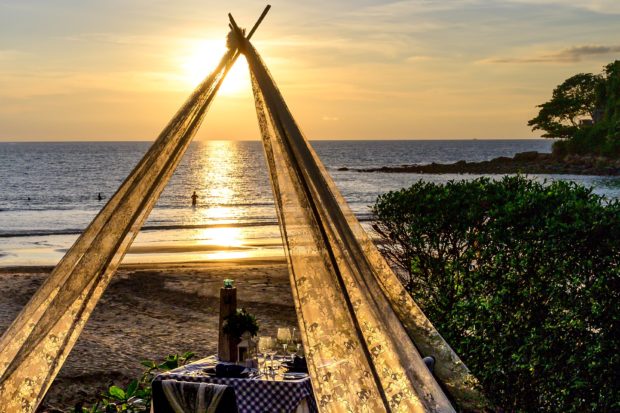
This photo taken on October 26, 2021 shows a table set for a romantic dinner on the beach on the Thai island of Phuket, as tourists take advantage of the “Phuket Sandbox” programme for visitors fully vaccinated against the Covid-19 coronavirus. AFP
BANGKOK — Hotels, street food carts and tuk-tuks are gearing up for the return of tourists to Bangkok as Thailand prepares to re-open on November 1 to fully vaccinated visitors after 18 months of Covid travel curbs.
But the steamy metropolis, the world’s most-visited city before the pandemic, will take some time to get back to its pulsating, intoxicating old self, industry experts say.
The coronavirus pandemic sent visitor numbers plummeting from 40 million in 2019 to just 73,000 in the first eight months of 2021 — leaving its tourism-reliant economy registering its worst performance in over two decades.
Authorities are desperate to revive the sector — which accounts for a fifth of the economy — despite Thailand still recording about 10,000 Covid infections a day and the vaccination rate lagging at about 40 percent.
The government is hopeful that a plan to phase out tough quarantine rules could lure visitors back to bars and beaches despite the prevalence of the virus.
“We have estimated the tourism industry will return to normal levels around the middle of next year,” Bangkok Metropolitan Administration spokesman Pongsakorn Kwanmuang said.
The kingdom is expecting the return of at least a million visitors by March and to generate about $30 billion in revenue through 2022, authorities say.
The absence of visitors has left an unmistakable impact on Bangkok’s Chinatown, with shuttered shops visible under the glare of neon lights and lines of empty tuk-tuks.
Samran, a driver for 25 years, saw his income drop by 90 percent and now earns just $3 a day.
“I want to stop but I am old, no one will hire me for anything else,” the 58-year-old said.
“I haven’t picked up a single tourist since April 2020.”
That was when Thailand closed its airspace to international flights in a bid to keep Covid at bay.
After this restriction was relaxed, authorities imposed a 14-day hotel quarantine, discouraging all but the most determined travelers.
A scheme to make it easier to visit the southern holiday island of Phuket, introduced in July as a first step towards normalcy, drew only a few tens of thousands of people — a drop in the ocean.
Re-opening in phases
In a bid to cauterize the hemorrhaging economy, Prime Minister Prayut Chan-O-Cha announced a phased plan for Thailand’s re-opening.
From November 1, fully vaccinated visitors traveling from more than 40 “low-risk” countries will be allowed to enter with a negative Covid result, retesting again upon arrival.
Included on the list are a slew of European countries as well as China and the United States.
China is Thailand’s largest source of tourists, accounting for 11 million visitors in 2019.
But with Beijing imposing a minimum two-week quarantine on returnees, few Chinese holidaymakers are likely to arrive at the kingdom’s sun-soaked beaches come November.
There is also no sign that India or Russia — two other major sources of visitors — will be added to the list soon.
The second stage of re-opening, planned for December 1, is to end a seven-month prohibition on booze in bars and restaurants — a move industry figures say is vital to entice thirsty visitors looking to cut loose.
“We are really waiting for the Thai government to lift the ban on alcohol, because it does not encourage tourists to return,” said Daniel Kerr, general manager of the Chatrium hotel.
The five-star establishment sits on the banks of Bangkok’s Chao Phraya River, and just 10 percent of its 400 rooms were occupied at the height of the Covid crisis.
Things are picking up now, with more than half of the rooms booked for New Year celebrations — though 85 percent of these reservations are from Thais.
‘I will not survive this’
The prolonged shutdown has “devastated” the hotel sector, Thai Hotels Association president Marisa Sukosol Nunbhakdi said, adding that nearly half of the industry’s employees were left jobless from closures and lay-offs.
With Bangkok’s remaining hotels chasing so few visitors, the industry is having to adapt to compete, dramatically slashing room rates.
“A fierce price war has been declared between hotels because supply will remain very abundant for a long time compared to demand,” she said.
These challenges are dampening Marisa’s expectations for the re-opening.
“If in the next few months we manage to fill the hotels to 25-30 percent capacity, that will be a success,” Marisa said, but she does not anticipate a return to normal before 2024.
For those at the industry’s sharp end, the recovery may come too late — especially with little state support on offer.
“I will not survive this,” said tuk-tuk driver Samran. “What do they want? Do they want me to beg in the streets? Do they want me to die of hunger?”